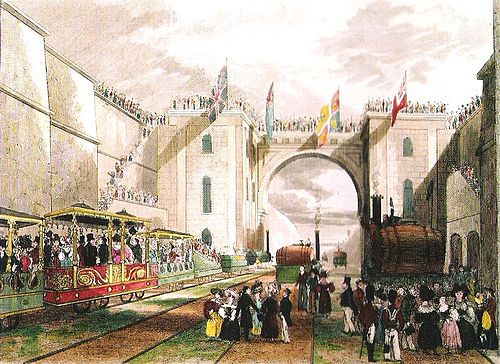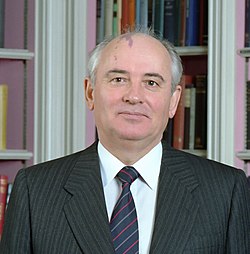First featured picture from the legally disputed National Portrait Gallery images; two Chicago icons
New administrators
The Signpost welcomes our two new admins:
- Ironholds (nom), has been a Wikipedia editor since early 2006 and has experience in WP:CSD and WP:AFD. His particular interest is current English law, and English legal history; he says among his best work is a featured article he "brought up from almost nothing", Court of Chancery.
- Lear's Fool (nom) has been editing since late 2009, and has worked on vandalfighting, NPP, article writing, and referencing other people's contributions. He has recently been active at the Unreferenced BLP cleanup drive.
At the time of publication there was one live RfA: GiantSnowman, due to finish 21 January.
Featured articles

- Monadnock Building (nom), which has a special place in the history of Chicago architecture. The largest office building in the world when constructed 1891–93, it became the first example in a movement during the 20th century to remodel old skyscrapers as a means to preserve them, and one of the most ambitious office building restoration projects ever undertaken (Nasty Housecat; picture at top).
- Royal Maundy (nom), "one of those quirky British ceremonies which fascinate everyone", says nominator Wehwalt. "I believe it has survived as is because of the enthusiasm of the Queen, and ... this may well be the best resource on the ceremony out there, as the two books I'm aware of on the ceremony are a bit dated." (picture at right)
- Opening of the Liverpool and Manchester Railway (nom)—not the dull article you might think: within 20 years, Britain was a democratically ruled industrial and military superpower, Manchester was the focal point of the world economy, and the rising nations of Prussia, Russia and the United States were coming to see the implications of being able to move large numbers of people at short notice (Iridescent).
- Hill 303 massacre (nom), a war crime on 17 August 1950 during the Korean War on a hill above Waegwan, South Korea, in which 41 US Army prisoners of war were machine-gunned by members of the North Korean People's Army (Ed!).
- Thistle, Utah (nom), a ghost town in Utah about 105 km (65 mi) southeast of Salt Lake City. (Moabdave).

Choice of the week. We asked FA nominator/reviewer EdChem for his choice of the best FA this week:
- "Trying to choose a "best" FA from such a variety of topics is almost inevitably subjective, so I've chosen to base my decision on what I found most interesting. I was looking for an article that caught and held my attention, that made me want to keep reading. I was impressed by the Monadnock Building article, and was surprised that so much documented history could be squeezed into one building. I was intrigued by the Hill 303 massacre article, as it described a part of Korean War history of which I was unaware. And I certainly agree with the description of Royal Maundy as "one of those quirky British ceremonies which fascinate everyone".
My choice, however, is the article on the opening of the Liverpool and Manchester Railway which describes the most eventful opening of a railway line that one might imagine. I'd generally expect that 105 kB for an article on the opening of a railway line would be overkill, or (let's be honest) dull. But with a derailment, an unrelated fatality, a Prime Minister pelted with vegetables, a world land speed record, a politician resigning on an issue of a lack of representation for his constituents, a funeral attended by an estimated 69,000 people. and the opportunity to a learn a new word ("deodand"), this article has plenty to hold your interest. Kudos to Iridescent: this is an impressive article and well worth taking the time to read."
Featured lists

- List of battleships of the Ottoman Empire (nom) (nominated by White Shadows)
- List of X-Men video games (nom) (Guyinblack25, Nomader and -5-).
- List of leaders of the Soviet Union (nom) (Trust Is All You Need; picture at right).
- List of Oslo Tramway and Metro operators (nom) (Arsenikk; picture at bottom).
- Grammy Award for Best Solo Rock Vocal Performance (nom) (Another Believer).
Two featured lists were delisted:
- List of YuYu Hakusho episodes (season 1) (nom: referencing, comprehensiveness, lead)
- 109th United States Congress (nom: referencing, comprehensiveness)
Featured topics
One topic was promoted:
- König class battleships (nom), with three featured articles and two good articles. The Königs were the last class of completed German dreadnoughts built before World War I. The four Königs saw heavy service during the war, including their leading of the German line at the Battle of Jutland (nominator Parsecboy).
One featured topic, Celebration, was delisted for insufficient coverage of the topic.
Featured pictures


- Lady Margaret Beaufort (nom; related article) (1443–1509), "a remarkable and important woman. This more medieval style isn't something we see a lot at FPC", said nominator J Milburn. The image is from a set gathered by User:Dcoetzee from the website of the National Portrait Gallery, London, using a special tool. In 2009, this action resulted in legal threats by the Gallery that were rebuffed by the Wikimedia Foundation (see Signpost coverage); a National Portrait Gallery (NPG) representative discussed the affair at the GLAM-WIKI conference last month (Signpost coverage). The authorship of all images in this batch is unknown. picture at right
- Century of Progress (nom; related article), a poster depicting the architectural symbol of this technology-themed centennial for the city, the Sky Ride, a transporter bridge perpendicular to the shore on which one could ride from one side of the fair to the other (created by Weimer Pursell, restored by Jujutacular; picture at top).
- Maxim Gorky (nom; related article) (1868–1936), a monochrome film copy negative of the Russian novelist taken in 1906 Fallschirmjäger; picture at right).
- Tonna galea (nom; related article), a large sea snail found in seas around New Zealand up to depths of 35 metres. Its saliva contains 2–4% sulfuric acid, which enables it to kill its prey, sea stars (created by H. Zell).
- Divine conch (nom; related article), an Indian Ocean species considered to be sacred in Hinduism and Buddhism; it is one of the eight "auspicious symbols". The live animal is notable for having gills and an operculum (created by H. Zell).
- James Webb Space Telescope Mirror Production (nom; related article), shot at the X-ray and Cryogenic Facility at NASA's Marshall Space Flight Center in Huntsville, Alabama, during the production of the mirrors for the James Webb Space Telescope before the final gold coating and just before the cryogenic testing. The photographer used specialised filters on the flash to make the industrial sterilised environment of the clean-room seem more dynamic and interesting than it would have been if it was shot with natural light (created by NASA/MSFC/David Higginbotham/Emmett Given).
- Panellus stipticus (nom; related article), a common and widely distributed species of bioluminescent fungi that grows on decaying deciduous trees, especially beech, oak, and birch. The bioluminescent effect seen here is called foxfire. The photo was taken at 800 ISO with an eight-minute exposure. A flashlight was used to add highlight lighting on the tree trunk (created by Ylem).
- Richea scoparia (nom; related article), photographed between Waterfall Valley and Lake Holmes, Cradle Mountain, in Lake St Clair National Park, Tasmania. The spike is around 6 cm high (created by Noodle snacks).

Information about new admins at the top is drawn from their user pages and RfA texts, and occasionally from what they tell us directly.




Discuss this story